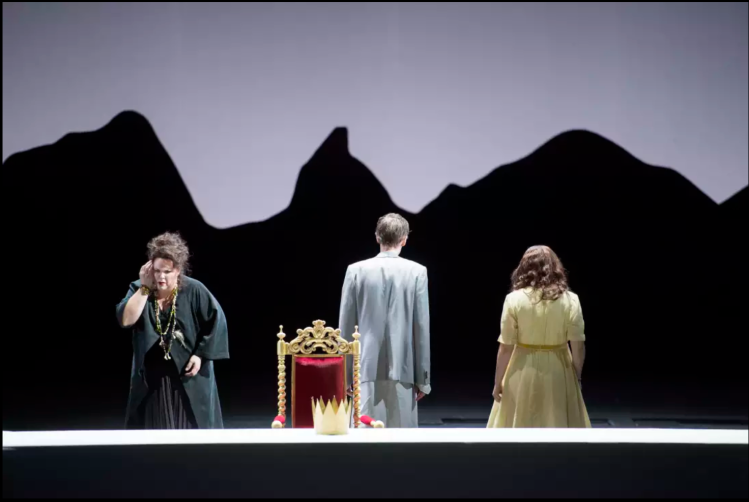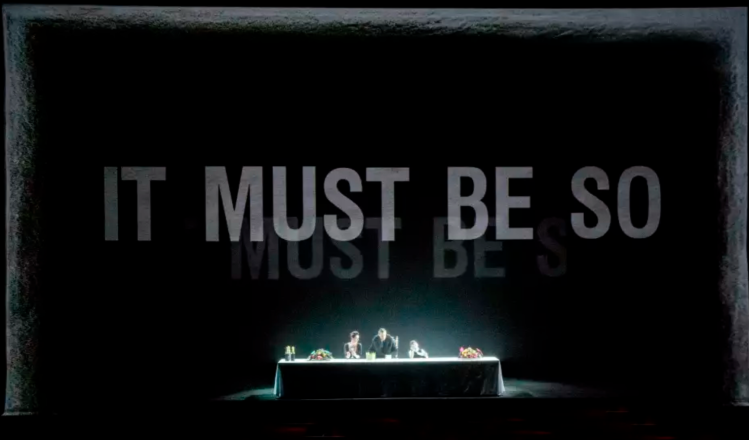I have to admit that my exploration path towards a better understanding of baroque opera has been long and thorny, and I am still far away from becoming an aficionado of that era in music. Nevertheless, I am not giving up and looking to learn more, as a better understanding of the topic brings acceptance and admiration. Thus, seeing a combination of world-renowned baroque specialist William Christie and a great cast directed by Claus Guth, I anticipated an opportunity to get new insight and learn a lot from experience.
Unfortunately, the seat I have chosen had restricted view thus most of the set and action on stage was obstructed, and probably impacted my perception of the performance, – but, on the other hand, diverting my attention to the music rather than activities on the stage. The set was minimalistic, dominated by moving letters, forming the repeating recitative “It must be so” – the predicament of inescapable fate determined from above.
As William Christie noted in an interview with Opera de Paris, Jephtha is the creative climax of Handel’s career, encompassing the ideas and humanistic values of enlightenment and exquisite musical passages thus creating a perfect blend of drama and music. Handel chose to divert from the Biblical legend, saving Iphis; he also omits pre-history and origins of Jephtha, who, being outcast and illegitimate child, seeks for recognition and acceptance and thus violates the sacredness of human life.

Ian Bostridge as Jephtha © Monika Rittershaus / OnP
Ian Bostridge created a wholesome character of Jephtha: a father and a warrior, faithful believer and an outcast, a sufferer and an oppressor. He is torn between the roles and value sets and still looks for the least of evils. The duty is above family, the faith is above human life. Bostridge found different colours to express impossible choices his protagonist has to make, to explain how the vow made to God to sacrifice the first human being met upon return home in exchange for victory persecutes the oathmaker.

Marie-Nicole Lemieux as Storgé © Monika Rittershaus / OnP
Anger, suffering, disbelief comes into a palette of Marie-Nicole Lemieux as Storgé, mother and wife, her voice especially expressive in chest register, while easy reaching piercing high notes. Her “Scenes of horror” were soul shattering and electrifying, unforgettable. Very much looking forward to seeing her Dalila in June!

Ian Bostridge (Jephtha) and Katherine Watson (Iphis) © Monika Rittershaus / OnP
Very impressive and deeply moving performance from Katherine Watson in the role of Iphis, Jephtha’s daughter. She is the unlucky one Jephtha meets upon return home that makes her sacrificial offering to the vow made to God, and Iphis succumbs to the fate. Katherine Watson has clear, silvery soprano which fits well the role and projects innocence and fragility.
Her suitor Hamor was performed by Tim Mead, his clear and even countertenor voice was especially moving in the farewell scene. He projects soft and pleasant sound, with a mellow tone, thus creating a youthful and emotional character.

© Monika Rittershaus / OnP
The orchestra and chorus of the Arts Florissants led by William Christie were true stars of the evening. The orchestra created distinctive and full sound, a fantastic blend of instruments, so well accentuated by period brass, and all together driving the performance mesmerising the audience. They were impeccably paired with the chorus, which played a crucial role since there are numerous choral passages that create a collective protagonist with its own voice and opinion.
The performance poses a number of questions, all of them referring to our individual value sets as well as collective norms of the society and this century. Do we really need an angel to save us from ourselves and harm we are inflicting upon individuals and society at large?
Jephtha
Oratorio in three acts
- Music Georg Friedrich Haendel
- Libretto Thomas Morell
- Performance on January 20th, 2018
- Conductor William Christie
- Director Claus Guth
- Jephtha Ian Bostridge
- Storgé Marie-Nicole Lemieux
- Iphis Katherine Watson
- Hamor Tim Mead
- Zebul Philippe Sly
- Angel Valer Sabadus
- Set design Katrin Lea Tag
- Lighting design Bernd Purkrabek
- Video Arian Andiel
- Choreography Sommer Ulrickson
- Dramaturgy Yvonne Gebauer
- Chorus master François Bazola
Orchestre et Choeur des Arts Florissants
Coproduction De Nationale Opera, Amsterdam

de Chareli
Les Arts Florissants is a truly fantastic ensemble. They have recorded Lully’s motets – a gem!
LikeLike